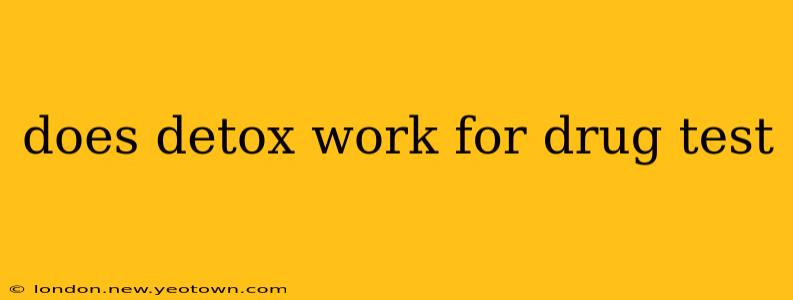Does Detox Work for a Drug Test? The Truth About Cleansing Your System
The question buzzing in your mind – "Does detox work for a drug test?" – is one many face with a mix of hope and anxiety. Let's dive into the realities of detox and drug testing, separating fact from fiction. The short answer is complex: it can work, but it's far from a guaranteed solution and comes with significant risks. This isn't a get-out-of-jail-free card, and the effectiveness depends heavily on several factors.
This isn't just about passing a test; it's about understanding your body, the limitations of detox methods, and the potential consequences of attempting to manipulate drug test results.
What are the Different Types of Detox Methods?
Several methods claim to help cleanse your system of drugs, each with varying degrees of effectiveness and potential dangers.
-
Commercial Detox Products: These often involve pills, drinks, or teas promising rapid cleansing. While some might temporarily alter the concentration of drugs in your urine, these products rarely eliminate all traces and are often not rigorously tested for safety or efficacy. The claims are often exaggerated.
-
Home Detox Methods: These typically involve increased water intake, consumption of specific foods or drinks believed to have cleansing properties (like cranberry juice), and rigorous exercise. While these methods may marginally help your body process toxins, their effectiveness in passing a drug test is questionable. They're not a reliable method for eliminating drugs from your system.
-
Professional Detox Programs (Medical Detox): These medically supervised programs are very different from over-the-counter detox kits. They focus on managing withdrawal symptoms and supporting overall health during detoxification. They do not guarantee you'll pass a drug test. Their primary goal is to safely help you withdraw from substances.
How Long Do Drugs Stay in Your System?
The length of time drugs remain detectable in your system varies significantly depending on several factors:
-
Type of Drug: Different drugs have different metabolisms and detection windows. Some drugs, like marijuana metabolites, can linger for weeks or even months, especially with chronic use.
-
Frequency of Use: Frequent or heavy drug use extends the detection period.
-
Metabolism: Individual metabolic rates influence how quickly the body processes drugs.
-
Drug Testing Method: Different tests (urine, blood, hair follicle) have varying detection windows.
Therefore, there's no single answer to this. Research specific drug detection windows for different testing methods.
Can Detoxing Mask a Positive Drug Test Result?
While some detox methods might temporarily lower the concentration of drugs in your system, they rarely completely eliminate all traces. A thorough drug test may still detect even minimal amounts. Therefore, relying on detox for a foolproof way to mask a positive test result is risky.
Is Detox Safe?
The safety of detox methods varies dramatically. Commercial detox products are often unregulated, potentially containing harmful ingredients or causing adverse health effects. Even home remedies, while seemingly harmless, can interact with medications or have unintended consequences. Professional medical detox is the safest option, but it's designed for withdrawal management, not for passing a drug test.
What are the Consequences of Failing a Drug Test?
The repercussions of failing a drug test depend heavily on the context. For employment, it could mean losing a job offer or your current job. For legal reasons, it could lead to legal charges or repercussions. Understanding these consequences is crucial before considering any attempt to manipulate drug test results.
Conclusion:
While the allure of a quick detox solution is understandable, it's essential to approach the matter realistically. The success rate of detox in passing a drug test is highly variable and uncertain. Instead of focusing on ways to mask positive results, consider addressing the underlying drug use and seeking professional help for substance abuse. This approach is far safer, healthier, and more likely to lead to positive long-term outcomes.

